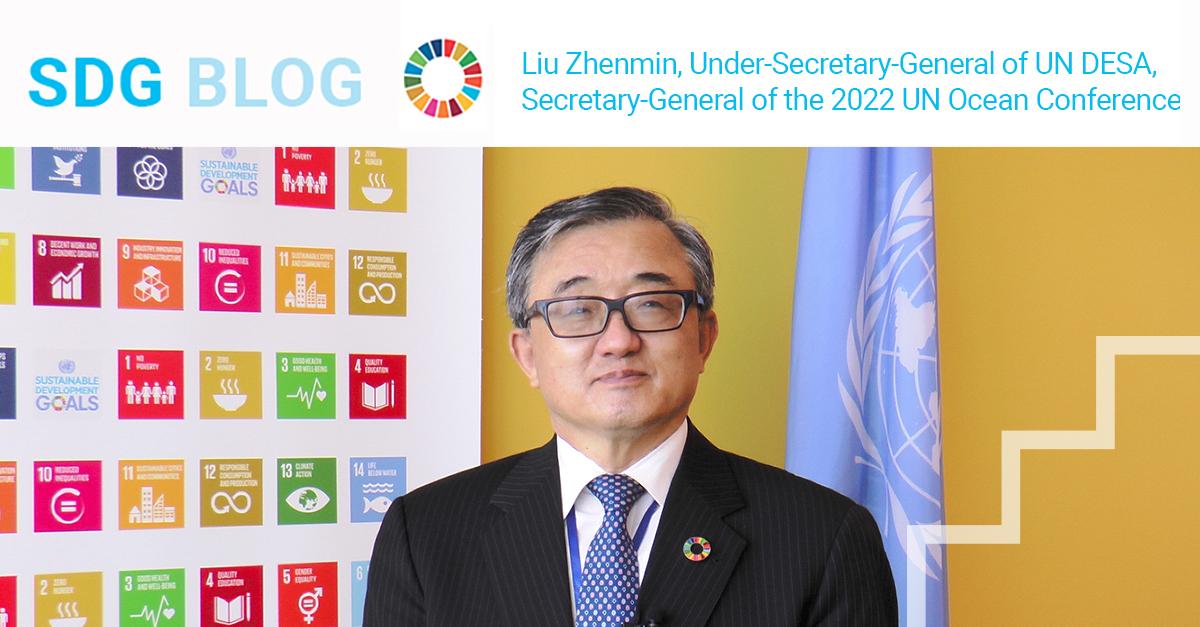SDG Blog

Now is the time to save our ocean and protect our future
By Liu Zhenmin, Under-Secretary-General of UN DESA and Secretary-General of the 2022 UN Ocean Conference
Our ocean is a beautiful blue wonder. It regulates our climate, fills our lungs with oxygen and provides food and jobs for millions of people around the globe.
Most of us have a connection to the ocean. And we all depend on it for our survival. In fact, according to the latest SDG data, more than 3 billion people rely on the ocean for their livelihoods.
The ocean also serves as the home for countless ocean species and a wealth of biodiversity. There are even some species below the water surface that are yet to be known to us humans.
The ocean generates 50 per cent of the oxygen we need and absorbs 25 per cent of all carbon dioxide emissions emitted into the air. It serves as the largest carbon sink, protecting us from some of the impacts of climate change.
But our ocean is not doing well. In fact, human activities have severely harmed the ocean’s health, placing this vital resource – and those who depend on it - in the face of grave danger.
It is estimated that around 11 million tonnes of plastics end up in the ocean every year. According to the UN Environment Programme (UNEP), this has affected 66 per cent of marine mammals, 50 per cent of seabirds and all species of sea turtles. In addition to threatening and harming marine life, plastic pollution also takes a toll on the global economy with a yearly price tag of roughly 13 billion for clean-up costs and financial losses.
The rate of ocean warming is another major problem. Since 1993, this has more than doubled due to carbon emissions from human activities. This has also led to acidification and oxygen loss in the ocean. It is estimated that around 30-35 per cent of critical marine habitats, such as seagrasses, mangroves and coral reefs have been extinguished.
If we do not act now, UNESCO estimates that more than half of the world’s marine species could face extinction by 2100.
The latest data on Sustainable Development Goal 14 (to conserve and sustainably use the oceans, seas and marine resources for sustainable development), tell a similar story. They paint a disturbing picture of dead zones in the world’s coastal waters increasing at a worrying pace. The data also reveals that funding for marine research pales in comparison to the massive economic contribution of the world’s oceans.
It is against this urgent backdrop that the global community will be gathering for the 2022 UN Ocean Conference in the Portuguese capital of Lisbon from 27 June to 1 July 2022. As Conference Secretary-General, I am excited to see the great interest that the event is generating, from UN Member States, civil society, businesses, the scientific community, youth representatives, and a variety of other international actors.
Organized around the theme, “Scaling up Ocean Action Based on Science and Innovation for the Implementation of Goal 14: Stocktaking, Partnerships and Solutions”, the Conference will bring together world leaders and prominent global experts on ocean issues.
In addition to a brief, action-oriented and intergovernmentally agreed declaration, with the Conference is expected to result in new voluntary commitments to improving the state of our ocean. These commitments will build on the efforts initiated at the 2017 UN Ocean Conference, when a large number of voluntary commitments were announced and launched. There are more than 1,700 registered voluntary commitments to date, covering all targets of SDG 14. These commitments have so far resulted in impacts that range from increasing coverage of marine protected areas to removing marine litter and enhancing scientific cooperation and education. We need even more commitments and increased action, so that we can create positive ripple effects that benefit our ocean’s health.
Together, we also need to make sure that this event contributes to science-based solutions, innovations, and partnerships.
It is time to turn the tide. Now is the time to save our ocean, if we want to protect our future. For the sake of life on our planet - above and below water, and for current and future generations, let’s make this an event that will go down in history books for the way it changed our course.
 Welcome to the United Nations
Welcome to the United Nations